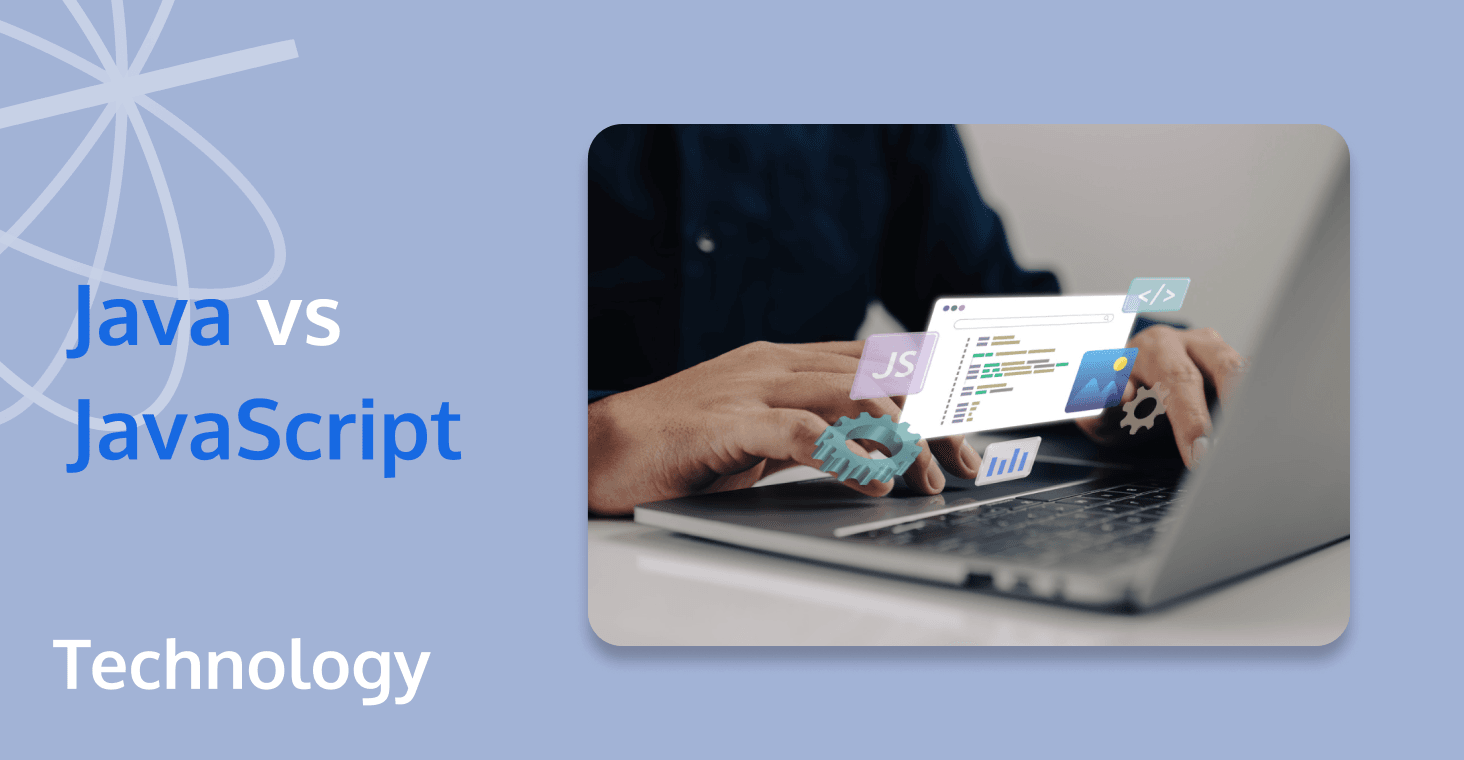
Java and JavaScript are two of the most widely-used programming languages, each with its unique features and applications. Java, known for its portability and performance, is a powerful language used in large-scale enterprise environments and Android development. On the other hand, JavaScript is mainly applied in web development, enabling dynamic and interactive user experiences. This article introduces you to Java vs. JavaScript differences and highlight their features to compare and decide which best fits your programming goals.
What's Java?
Java is a widely used programming language, with about 35% of developers worldwide using it. It's for all-round use, meaning you can create different types of applications that work on different devices and platforms. When you write a Java program, you're giving instructions to the computer in a language that all computers can understand, like a universal language.
Popular applications like the original Minecraft game, Eclipse (a popular tool for programmers), and most Android apps are all built using Java. Major companies like Netflix, Uber, and Airbnb also rely on Java for their backend systems. Your everyday devices such as smart TVs and Blu-ray players use Java too.
Features of Java
Java is a great language worth learning because it has many features that make creating all kinds of programs easier and more efficient.
- Platform Independence: Java's "write once, run anywhere" capability is powered by the Java Virtual Machine (JVM), allowing code to be executed on any platform without modification.
- Object-Oriented Programming: Java supports OOP concepts such as inheritance, polymorphism, encapsulation, and abstraction, making it modular, flexible, and easier to maintain.
- Robust and Secure: Java provides strong memory management, exception handling, and a rich set of APIs to ensure robust applications. It also includes security features like bytecode verification and sandboxing.
- Multithreading: Java supports multithreaded programming, allowing concurrent execution of two or more threads for maximum CPU utilization.
What's JavaScript?
JavaScript is a type of scripting language designed mainly to make web pages interactive. It was created by Netscape in the mid-1990s and works on all modern web browsers. Unlike Java, which needs to be compiled before running, JavaScript is interpreted directly by the browser without any extra steps needed.
You can use JavaScript for a variety of web designs and functions, some popular uses of JavaScript include:
Adding dynamic features to web pages, like drop-down menus, image sliders, and pop-ups.
- Building Single-Page Applications (SPAs) with frameworks such as React, Angular, and Vue.js for smooth user experiences without page reloads.
- Server-side scripting with Node.js, enabling developers to create entire web applications using one language.
- Developed mobile apps for iOS and Android using technologies like React Native and NativeScript.
- Creating simple browser-based games using HTML5 canvas and JavaScript game libraries.
Features of JavaScript
JavaScript is a versatile language for web development, offering a range of powerful features:
- First-Class Functions: Functions in JavaScript are treated as first-class citizens, meaning they can be assigned to variables, passed as arguments, and returned from other functions.
- Lightweight and Fast: JavaScript is designed to be lightweight, making it fast to execute and suitable for real-time web applications.
- Dynamic Typing: JavaScript supports dynamic typing, allowing variables to be assigned and re-assigned different data types during runtime.
- Event-Driven Programming: JavaScript responds to user actions such as clicks, mouse movements, and keystrokes, enabling responsive and interactive web applications.
What Is the Difference Between Java and JavaScript?
Is Java and JavaScript the same? The quick answer is no. Both have different uses and ways of working. Java is a compiled, statically typed language. It runs on the Java Virtual Machine (JVM), where Java code is compiled into bytecode that the JVM executes. Java supports multithreading, making it suitable for concurrent programming tasks. Java is best used in large-scale applications, Android mobile development, financial services, scientific computing, and contexts demanding robustness, scalability, and cross-platform compatibility.
Unlike Java, JavaScript is not compiled before running; instead, it's read and executed directly by web browsers. It operates within the browser's JavaScript engine, interpreting code directly without prior compilation. JavaScript's single-threaded nature and event-based model facilitate asynchronous programming, crucial for responsive user interfaces in web applications. JavaScript can also be used server-side with platforms like Node.js, expanding its versatility beyond client-side applications.
Java or JavaScript: Which Should You Learn?
If you are a beginner looking to start coding, JavaScript is a great choice. It's easier to learn with a straightforward syntax, widely used in web development for creating websites. You can run JavaScript directly in your browser, making it accessible for quick testing and development. It is also helpful, especially for creating simple web pages or even your portfolio.
Or if you are focusing on creating software or mobile applications, then Java is ideal for you. Its static typing ensures reliability by catching errors early in development. Java also offers strong security features and scalability, efficiently handling complex applications. For long-term use, Java is reliable and easy to maintain. It's great for building applications that stay stable and can grow as needed over time.
Conclusion
The debate between Java vs JavaScript has been going on for a while, often because people don't fully understand how they're used. Both languages are essential in programming and both serve different purposes. When you're deciding between Java and JavaScript, think about what you want. This article focusing on their key differences aims to help you pick the right language to create a good software or website.
FAQs
Is JavaScript better than Java?
JavaScript and Java serve different purposes: JavaScript is primarily for web development, enabling interactive web pages, while Java is a versatile, object-oriented language used for building server-side applications, mobile apps, and more. Whether one is better than the other depends on your specific project requirements and goals.
How does Java's architecture support cross-platform functionality?
Java's architecture allows it to run on different platforms using the Java Virtual Machine (JVM). The JVM translates Java code into instructions that any platform can understand, so you can write a Java program once and run it on any device with a compatible JVM.
Is JavaScript sufficient for back-end development?
JavaScript is commonly used for front-end web development, but it is also suitable for back-end development. Its syntax is similar to languages like Java, C, and C#, and it has an extensive ecosystem of libraries and frameworks, such as Express.js, which supports robust back-end development.
If you have any questions or need assistance, our support team is always ready to help. Please feel free to Contact Us or join us in Telegram or Discord.


